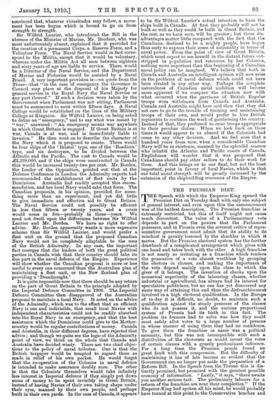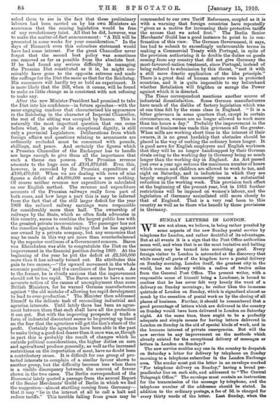THE PRUSSIAN DIET.
THE Speech with which the Emperor-King opened the Prussian Diet on Tuesday dealt with only one subject of general interest, and even upon this the announcement was of the baldest description. The Prussian franchise is extremely restricted, but this of itself might not cause much discontent. The value of a Parliamentary vote depends in part on the powers that the Parliament possesses, and in Prussia even the severest critics of repre- sentative government must admit that its ability to do mischief is greatly lessened by the shackles in which it moves. But the Prussian electoral system has the further drawback of a complicated arrangement which gives with one hand and takes back with the other. A high franchise is not nearly so irritating as a franchise which renders the possession of a vote almost worthless by grouping the electors in classes, and making the importance of the vote depend. mainly upon the class to which the giver of it belongs. The invention of checks upon the numerical superiority of the labouring classes, whether industrial or agricultural, has always had its interest for speculative politicians, but no one has yet discovered any surer way of attaining this end than the disfranchisement involved in a high electoral qualification. In the Europe of to-day it is difficult, no doubt, to maintain such a qualification against the steady pressure of the classes who do not possess it, and the curious proportional system of Prussia had its birth in this fact. The problem its framers had to solve was how they could most safely allot votes to a large number of persons in whose manner of using them they had no confidence. To give them the franchise in name was a political necessity, but this was not incompatible with such a distribution of the electorate as would invest the votes of certain classes with a greatly predominant influence. For a long time the Prussian people found. no great fault with this compromise. But the difficulty of maintaining it has of late become so evident that the Government can no longer put aside the preparation of a Reform Bill. In the Speedh from the Throne this is dis- tinctly promised, but promised with the greatest possible economy of information. " Lastly," it says, " there awaits you another serious task. The preliminary labours for a reform of the franchise are near their completion." If the Emperor-King had spoken all his mind, he would probably have turned at this point to the Conservative benches and asked them to see in the fact that these preliminary labours had been 'tarried on by his own Ministers an assurance that the coming legislation would bo free of any revolutionary taint. All that he did, however, was to make the matter-of-fact announcement : "A Bill will be presented in some weeks for your consideration." In the days of Bismarck even this colourless statement would have had some interest. For the great Chancellor never forgot that the second best policy was sometimes one removed as far as possible from the absolute best. If he had found any serious difficulty in managing the Prussian Diet constituted as it is, he might con- ceivably have gone to the opposite extreme and made the suffrage for the Diet the same as that for the Reichstag. His successors will hardly try so bold an experiment. It is more likely that the Bill, when it comes, will be found to make as little change as is consistent with not refusing to make any.
After the new Minister-President had promised to take the Diet into his confidence—in future speeches—with the same engaging candour that characterised his appearance in the Reichstag in the character of Imperial Chancellor, the rest of the sitting was occupied by finance. This is naturally the most important question that can come before what, in spite of its exceptional dignity, is still only a provincial Legislature. Deliberations from which foreign affairs and questions relating to armaments are ordinarily excluded. must be concerned with pounds, shillings, and pence. And certainly the figures which a Prussian Chancellor of the Exchequer has to handle are large enough to give them all the importance that such a theme can possess. The Prussian revenue amounts to the huge sum of £191,870,648. Even this, however, is exceeded by the Prussian expenditure of £196,470,648. When we are dealing with rows of nine figures a deficit of £4,600,000 seems a mere nothing. Of course neither revenue nor expenditure is calculated on our English method. The revenue and expenditure accounts of the Prussian railways really form part of both sums, and how large a part this is may be inferred from the fact that of the still larger deficit for the year 1908 the reduced railway earnings were responsible for considerably more than half. The ownership of railways by the State, which so often finds advocates in this country, seems to combine the largest public loss with the greatest private inconvenience. The passenger has not the remedies against a State railway that he has against one owned by a private company, but any economies that may be made in this way are more than counterbalanced by the superior costliness of a Government concern. Baron von Rheinbaben was able to congratulate the Diet on the improvement in the financial position during 1909. At the beginning of the year he put the deficit at £2,550,000 more than it has actually turned out. He attributes this gain to two causes,—" the upward movement in the whole economic position," and tle excellence of the harvest. As to the former, he is chiefly anxious that the improvement should not be too rapid. The Baron seems to have a more accurate notion of the causes of unemployment than some British Ministers, for he warned German manufacturers against " the old mistake of allowing too rapid development to lead to over-production." The Minister then addressed himself to the delicate task of reconciling industrial and agrarian interests. -Until lately there has been an agree- ment between them that each shall have all the protection it can get. But with the improving prospects of trade a, form of industrial discontent seems to be growing up based on the fear that the agrarians will get the lion's share of the profit. Certainly the agrarians have been able in the past to make living a good deal dearer than it once was, as, though in part this is probably the result of changes which lie outside political considerations, the higher duties on corn and agricultural produce generally, as well as the increased restrictions on the importation of meat, have no doubt been a contributory cause. It is difficult for one group of pro- tected interests to complain of a similar favour shown to another group, but the difficulty becomes less when there is a visible discrepancy between the amount of favour shown in the two cases. The Berlin correspondent of the Economist lately quoted a passage from the annual Report of the Senior Merchants' Guild of Berlin in which we find the suggestion—almost startling coming from Germany— that it may " lie in the interest of all to call a halt and reduce tariffs." This terrible falling from grace may be commended to our own Tariff Reformers, coupled as it is with a warning that foreign countries have repeatedly " given as a motive for increasing their protective tariffs the excuse that we acted first.' The Berlin Senior Merchants' Guild has a good instance to point to in con- firmation of this view. The German Government, it says, has had to submit to exceedingly unfavourable terms in making a, Commercial Treaty with Portugal, in spite of the provision authorising it to double the duties on goods coming from any country that did not give Germany the most-favoured-nation treatment, since Portugal, instead of being reduced to submission by this threat, " met it with a still more drastic application of the like principle." There is a great deal of human nature even in protected countries, and it is quite impossible to say beforehand whether Retaliation will frighten or enrage the Power against which it is directed.
The Times correspondent mentions another source of industrial dissatisfaction. Some German manufacturers have much of the dislike of factory legislation which was at one time felt by the same class in England. " It is a bitter grievance in some quarters that, except in certain circumstances, women are no longer allowed to work more than ten hours a day." Probably the improvement in the course of business has made this grievance all the greater. When mills are working short time in the interest of their owners, it is no great hardship that obstacles should be placed in the way of making the ordinary hours longer. It is good news for English employers and English workmen that they will be no longer handicapped by their German rivals owing to the working day in Germany being so much longer than the working day in England. An Act passed just over a year ago reduces the maximum number of hours which women and children are allowed to work to ten, and eight on Saturday, and in industries in which they are largely employed this necessarily means a substantial reduction in the working week. This provision took effect at the beginning of the present year, but in 1912 further restrictions will be imposed on women's labour, and the legislation of Germany assimilated still more closely to that of England. That is a very real boon to this country as well as to those who benefit by these provisions in Germany







































 Previous page
Previous page